| dc.contributor.author | Ediger, Volkan | |
| dc.contributor.author | Elfeky, Rahma | |
| dc.contributor.author | Karampalis, Dimitrios | |
| dc.contributor.author | Mengi, Hazal | |
| dc.contributor.author | Tan, Sadık Erkan | |
| dc.contributor.author | Bowlus, John Vincent | |
| dc.contributor.other | Friedrich Naumann Foundation for Freedom’s Türkiye Office | en_US |
| dc.date.accessioned | 2023-08-03T08:16:18Z | |
| dc.date.available | 2023-08-03T08:16:18Z | |
| dc.date.issued | 2023 | |
| dc.identifier.citation | Ediger, V.S., Elfeky, R., Karampalis, D., Mengi, H., Tan, S.E., Bowlus, J.V. (2023). Natural gas exploitation in the Eastern Mediterranean: A holistic approach. KHAS Center for Energy and Sustainable Development, Istanbul, Turkey | en_US |
| dc.identifier.isbn | 9786059792172 | |
| dc.identifier.uri | https://hdl.handle.net/20.500.12469/4460 | |
| dc.description.abstract | Discoveries of significant natural gas reserves in the Eastern Mediterranean since 2010 have elevated the region’s geopolitical importance from being strictly based on security to one also based on energy and has thus drawn in outside powers that are eager to address their energy-supply security needs. The energy crises triggered first by the supply chain disruptions in 2021 and then the Russia-Ukraine War in 2022 have elevated the region’s importance as a potential energy supplier and transit hub for Europe.
This report takes a holistic approach to critically assess the activities carried out in the Eastern Mediterranean region in the fields of exploration, discovery, development, production, and export of natural gas, and the delimitation of exclusive economic zones (EEZs), as well as the effects that these activities have on the economies, policies, and strategies of Eastern Mediterranean countries at the interstate, regional and global levels. Previous studies have generally evaluated the activities related to natural gas in the Eastern Mediterranean from narrow perspectives and only a very small number have dealt with all these elements considered together and with analysis of cause-and-effect relationships on a regional or global scale.
The authors deploy a systemic approach that is similar to the petroleum system concept, which evaluates hydrocarbon generation, migration, accumulation, and entrapment in an entire petroleum system on the basis of its essential elements (sources, reservoirs, seals, and overburden rocks) and processes (trap formations and generation-migration-accumulation) as well as the preservation time and, most importantly, the critical moments when events are significant enough to affect the whole system.
Likewise, this report uses qualitative and quantitative media analysis of six newspapers – two from Egypt, two from Greece, and two from Turkey from the first discovery of gas by Israel in 1999 to 2023 – to determine the critical moments that have brought what the authors term the Eastern Mediterranean gas exploitation system (EMGES) to a crossroads, where either conflict and confrontation or stability and cooperation will prevail. No one can predict when this system will be overwhelmed by the essential elements (the ten Eastern Mediterranean states), the essential processes (activities related to gas exploitation and delimitation of EEZs), and the critical moments (major conflict periods). This is rendered even more uncertain by a rapidly shifting geopolitical context that is being shaped by the energy transition from fossil fuels to clean energy sources as well as the transition from a unipolar to a multipolar world. Given how interconnected all these factors are, only a holistic approach can help illustrate how the EMGES has reached this crossroads.
For stability and cooperation to prevail in EMGES, two conditions must be met. First, countries must recognize that they are directly interconnected and depend on one another and a common vision that balances the economic and strategic interests of each country to forge development and sustainability. Second, a robust cooperative structural framework must be developed that does not exclude any individual country and involves external powers, most notably the EU and the United States. | en_US |
| dc.language.iso | eng | en_US |
| dc.publisher | Kadir Has University Center for Energy and Sustainable Development | en_US |
| dc.rights | info:eu-repo/semantics/openAccess | en_US |
| dc.subject | Eastern Mediterranean | en_US |
| dc.subject | Gas Exploitation | en_US |
| dc.subject | System Assessment | en_US |
| dc.subject | Systemic Approach | en_US |
| dc.title | Natural Gas Exploitation in the Eastern Mediterranean: A Holistic Approach | en_US |
| dc.type | book | en_US |
| dc.department | Rektörlük, Rektörlüğe Bağlı Birimler, Center for Energy and Sustainable Development | en_US |
| dc.relation.publicationcategory | N/A | en_US |
















